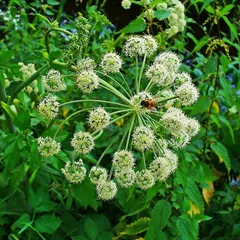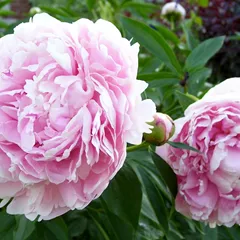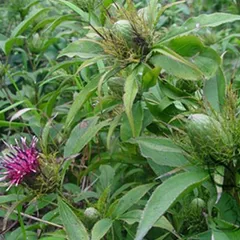Rebellious Liver Qi invading the Spleen
The information provided here is not a replacement for a doctor. You shouldn't use it for the purpose of self-diagnosing or self-medicating but rather so you can have a more informed discussion with a professional TCM practitioner.
At a glance
Preliminary reading: What is a pattern? The Liver in Chinese Medicine The concept of Qi The Spleen in Chinese Medicine
Key attributes
Chinese name: 肝气横逆犯脾 Pinyin name: Gān Qì Hèng Nì Fàn Pí
Pattern nature: Full combined pattern
Pattern(s) it combines from: Rebellious Liver Qi
Causes
Precursor patterns: Rebellious Liver Qi
Common causes: 1. Emotional stress, 2. Bad eating habits
Diagnosis
Common symptoms: Tiredness Flatulence Irritability Abdominal pain Abdominal distension and two other symptoms
Pulse type(s): Weak (Ruo), Wiry (Xian)
Tongue description: Normal-coloured or slightly Red on the sides
Treatment
Treatment principle: Subdue rebellious Liver Qi, tonify the Spleen.
Common formulas: Xiao Yao San Tong Xie Yao Fang
Pathology
Liver Qi is said to be rebellious when its horizontal movement is accentuated. This impairs the Spleen's function of transformation and transportation and prevents Spleen Qi from rising.
It is a pattern of mixed Deficiency and Excess: Excess of the Liver (Rebellious Qi) and Deficiency of Spleen Qi. In the Five-Phases theory, it corresponds to Wood overacting on Earth.
There are typically two types of presentations for this pattern.
The first is when the Excess of the Liver is more important than the Spleen's Deficiency. It is said that the Liver's overactivity invades the Spleen. In this presentation there is constipation (with stools that are dry, difficult and often in small pieces) more frequently than diarrhea and the abdominal distension and pain are quite marked.
In the second presentation the Spleen Qi Deficiency is more pronounced. This means the Spleen is weak and ‘allows’ itself to be invaded by the Liver, even when the Liver Excess is relatively mild. In this scenario there are loose stools, even diarrhea, more often than constipation and the abdominal pain is only slight.
Those two presentations are the reason why the tongue can either be Red on the sides (first presentation) or normal coloured (second presentation).
Causes
Precursor patterns: Rebellious Liver Qi invading the Spleen can derive from Rebellious Liver Qi
Emotional stress: Anger, frustration or resentment are all emotions that affect the Liver and which, if felt for a prolonged period of time (or very intensively over a short period), cause Liver Qi to stagnate. Stagnant Liver Qi may become Rebellious, accentuating its horizontal movement towards the Spleen. This disturbs the Spleen function of transformation and transportation and it prevents Spleen Qi from rising.
Bad eating habits: Irregular eating, eating in a hurry, when worried, when angry or while working can cause Liver Qi to rebel towards the Spleen.
Diagnosing Rebellious Liver Qi invading the Spleen
Diagnosing a pattern in Chinese Medicine is no easy feat and should be left to professional practitioners. In particular one has to know how to differentiate between different types of pulses and tongue coatings, shapes and colors as well as learn to read from a long list of seemingly unrelated symptoms.
Pulse type(s): Weak (Ruo) or wiry (Xian)
Tongue description: Normal-coloured or slightly Red on the sides
Main symptoms: Tiredness Flatulence Irritability Abdominal pain Abdominal distension Alternating constipation and diarrhea Stools sometimes dry and in small pieces
Diagnosis commentary: Alternation of constipation and loose stools and a Wiry pulse is enough in and of itself to diagnose Rebellious Liver Qi invading the Spleen.
Treating Rebellious Liver Qi invading the Spleen
Treatment principle
Subdue rebellious Liver Qi, tonify the Spleen.
Herbal formulas used to treat Rebellious Liver Qi invading the Spleen



The top herbs in Xiao Yao San are Bupleurum Roots (Chai Hu), Dong Quai (Dang Gui) and White Peony Roots (Bai Shao)
Xiao Yao San
Source date: 1107 AD
Number of ingredients: 6 herbs
Key actions: Harmonizes the function of Liver and Spleen. Relieves Liver Qi stagnation. Nourishes the Blood.
Formula summary
Xiao Yao San is a 6-ingredient Chinese Medicine formula. Invented in 1107 AD, it belongs to the category of formulas that harmonize Liver-Spleen.
Besides Rebellious Liver Qi invading the Spleen, Xiao Yao San is also used to treat Liver Blood Stagnation or Liver Qi Deficiency.



The top herbs in Tong Xie Yao Fang are Atractylodes Rhizomes (Bai Zhu), White Peony Roots (Bai Shao) and Tangerine Peel (Chen Pi)
Tong Xie Yao Fang
Source date: 1481 AD
Number of ingredients: 4 herbs
Key actions: Tonifies the Spleen. Softens the Liver. Expels Dampness. Stops diarrhea.
Formula summary
Tong Xie Yao Fang is a 4-ingredient Chinese Medicine formula. Invented in 1481 AD, it belongs to the category of formulas that harmonize Liver-Spleen.
Diet recommendations
Adopting good eating habits are very important to prevent this pattern. Eat at regular intervals and take the time to eat. Avoid working or other stressful activities while eating.
To prevent or mitigate Spleen Qi Deficiency, it's also important to favor eating cooked foods only, including rice, meat (especially beef), vegetables, congee and warm or room temperature drinks such as warm milk. Avoid anything too cold in temperature (e.g. ice cream or cold drinks), raw ingredients and the excessive use of sugar and other sweeteners.
To calm the Liver work with the emotions of anger, frustration and resentment by finding constructive outlets to express and release them. Above all, do not repress or stuff your emotions. Avoid excessive physical activity, such as sex or exercise. Regularity of habits helps to regulate Liver Qi.
Consequence patterns
Chronic Rebellious Liver Qi weakens the Spleen and can cause Spleen Qi Deficiency.
Rebellious Liver Qi combined with Spleen Qi Deficiency can lead to an impairment of the transportation and transformation of Fluids (a key function of the Spleen) and the formation of Dampness. This is a very common combination for patients suffering from irritable bowel syndrome.
